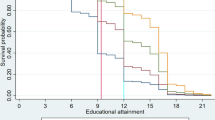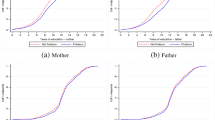Abstract
The first objective of this article is to clarify which model best captures the structure and trend of the influence of social origin on children's education. The second objective is to analyse how general conclusions on historical trends in educational reproduction change if we add mother's status background to the model. Six contrasting hypotheses are derived fromthe body of literature dealing with models on families' socioeconomic status. All hypotheses are translated into empirical models and their explained variance is compared. A pooled data set is used that contains data from the Netherlands, West Germany, and the USA. The Modified Dominance Model, that distinguishes the influence of the highest from thelowest status parent, has the best model fit. Regarding the second objective we see that adding the mother's influence to that of the father's does not change general conclusions on trends in educational reproduction. Over time the influence of both parents decreases continuously. However, the influence of the mother's education and occupational status on children's educational attainment is substantive.
Similar content being viewed by others
References
Acker, J. (1973). Women and social stratification: A case of intellectual sexism. American Journal of Sociology 78: 936-945.
Acock, A. & Yang, W. S. (1984). Parental power and adolescents' parental identification. Journal of Marriage and the Family 46: 487-495.
Bakker, B. F. M. & Cremers, P. G. J. (1994). Gelijke kansen in het onderwijs? Een vergelijking van vier cohorten leerlingen in hun overgang naar voortgezet onderwijs. Tijdschrift voor Onderwijsresearch 19: 191-203.
Blossfeld, H. P. & Jaenichen, U. (1990). Bildungsexpansion und Familienbildung. Soziale Welt 41: 454-476.
Boyd, C. J. (1989). Mothers and daughters: A discussion of theory and research. Journal of Marriage and the Family 51: 291-301.
Brückner, H. & Mayer, K. U. (1995). Lebensverläufe und Gesellschaftlicher Wandel. Konzeption, Design und Methodik der Erhebung von Lebensverläufen der Geburtsjahrgänge 1954-1956 und 1959-1961 (Teil I, II). Materalien aus der Bildungsforschung Nr. 48. Berlin: Max-Planck-Institut für Bildungsforschung.
Cohen, J. & Cohen, P. (1975). Applied Multiple Regression/Correlation Analysis for the Behavioral Sciences. Hillsdale, New Jersey: Lawrence Erlbaum Association.
Dronkers, J. (1995). The effects of the occupation of working mothers on the educational inequality. Educational Research and Evaluation 1: 226-246.
Erikson, R. (1984). Social class of men, women, and families. Sociology 18: 500-514.
Erikson, R. & Goldthorpe, J. H. (1993). The Constant Flux. A Study of Class Mobility in Industrial Societies. Oxford: Clarendon Press.
Ganzeboom, H. B. G. & De Graaf, P. M. (1983). Beroepsmobiliteit tussen generaties in Nederland in 1954 en 1977. Mens en Maatschappij 58: 28-52.
Ganzeboom, H. B. G., De Graaf, P. M. & Treiman, D. (1992). A standard international socioeconomic index of occupational status. Social Science Review 21: 272-288.
Ganzeboom, H. B. G., Rijken, S. & Weygold, R. (1994). Netherlands Family Survey 1992-1993. [ICS Occasional Papers and Documents Series, ICS Code Books-17.] Utrecht: Utrecht University.
Garnsey, E. (1978). Women's work and theories of class stratification. Sociology 12: 223-243.
Goldthorpe, J. H. (1983). Women and class analysis: In defence of the conventional view. Sociology 17: 465-488.
Goldthorpe, J. H. (1984). Women and class analysis: A reply to the replies. Sociology 18: 491-499.
Graetz, B. (1991). The class location of families: A refined classification and analysis. Sociology 25: 101-108.
Huttunen, J. (1992). Father's impact on son's gender role identity. Scandinavian Journal of Educational Research 36: 251-260.
Kalmijn, M. (1994). Mother's occupational status and children's schooling. American Sociological Review 59: 257-275.
Kalmijn, M., Bernasco, W. & Weesie, J. (1996). Households in the Netherlands 1995, Codebook of HIN95. [ISCORE Papers No. 67.] Utrecht: Utrecht University.
Korupp, S. E. (2000). Mothers and the Process of Social Stratification. [Dissertation Utrecht University.] Amsterdam: Thela Thesis.
Lopata, H. Z. (1994). Circles and Settings. Role Changes of American Women. Albany: State University of New York Press.
Mayer, K. U. (1983). Lebensverläufe und Wohlfahrtsentwicklung. [data] Berlin: Max Planck Institut für Bildungsforschung.
Mayer, K. U., Brückner, E. (1989). Lebensverläufe und Wohlfahrtsentwicklung. Konzeption, Design und Methodik der Erhebung von Lebensverläufen der Geburtsjahrgänge 1929-1931, 1939-1941, 1949-1951 (Teil I, II, III). Materalien aus der Bildungsforschung Nr.35. Berlin: Max-Planck-Institut für Bildungsforschung.
McDonald, G. (1977). Parental identification by adolescent: A social power approach, Journal of Marriage and the Family 39: 705-719.
McRae, S. (1986). Cross-Class Families. A Study of Wives' Occupational Superiority. Oxford: Clarendon Press.
Rijken, S. (1999). Educational Expansion and Status Attainment. A Cross-National and Over-Time Comparison. [Dissertation, Utrecht University.] Amsterdam: Thela Thesis.
Smith, M. D. & Self, G. D. (1980). The congruence between mother's and daughter's sex-role attitudes: A research note. Journal of Marriage and the Family 42: 105-109.
Sørensen, A. (1994). Women, family and class. Annual Review of Sociology 20: 27-47.
Starrels, M. E. (1992). Attitudes similarity between mothers and children regarding maternal employment. Journal of Marriage and the Family 54: 91-103.
Sweet, J., Bumpass, L. & Call, V. (1988a). The National Survey of Families and Household. [data]. Wisconsin: Center for Demography and Ecology.
Sweet, J., Bumpass, L. & Call, V. (1988b). The design and content of the national survey of families and household. NSFH Working Paper No. 1. [http://ssc.wisc.edu/cde/nsfhwp/home.htm].
Treiman, D. J. & Terrell, K. (1975). Sex and the process of status attainment: A comparison of working women and men. American Sociological Review 40: 174-200.
Ultee, W. C. & Ganzeboom, H. B. G. (1993). Netherlands Family Survey 1992-1993. [data] Utrecht: ICS.
Updegraff, K. A., McHale, S. M. & Crouter, A. C. (1996). Gender roles in marriage: What do they mean for girls' and boys' school achievement? Journal of Youth and Adolescence 25: 73-88.
Van Berkel, M. (1997). Who dominates when? Asymmetrical patterns of influence among Dutch husbands and wives. [Dissertation Nijmegen University.] Nijmegen: Mediagroep.
Van der Lippe, T., Van Dam, M. & Ganzeboom, H. B. G. (1995). De tweede sekse in stratificatieonderzoek. De invloed van de moeder op de kinderen naast die van de vader. Mens en Maatschappij 70: 41-53.
Weesie, J., Kalmijn, M. Bernasco, W. & Giesen, D. 1995. Huishoudens in Nederland 1995. [data] Utrecht: ISCORE.
Author information
Authors and Affiliations
Rights and permissions
About this article
Cite this article
Korupp, S.E., Ganzeboom, H.B.G. & Van Der Lippe, T. Do Mothers Matter? A Comparison of Models of the Influence of Mothers' and Fathers' Educational and Occupational Status on Children's Educational Attainment. Quality & Quantity 36, 17–42 (2002). https://doi.org/10.1023/A:1014393223522
Issue Date:
DOI: https://doi.org/10.1023/A:1014393223522




